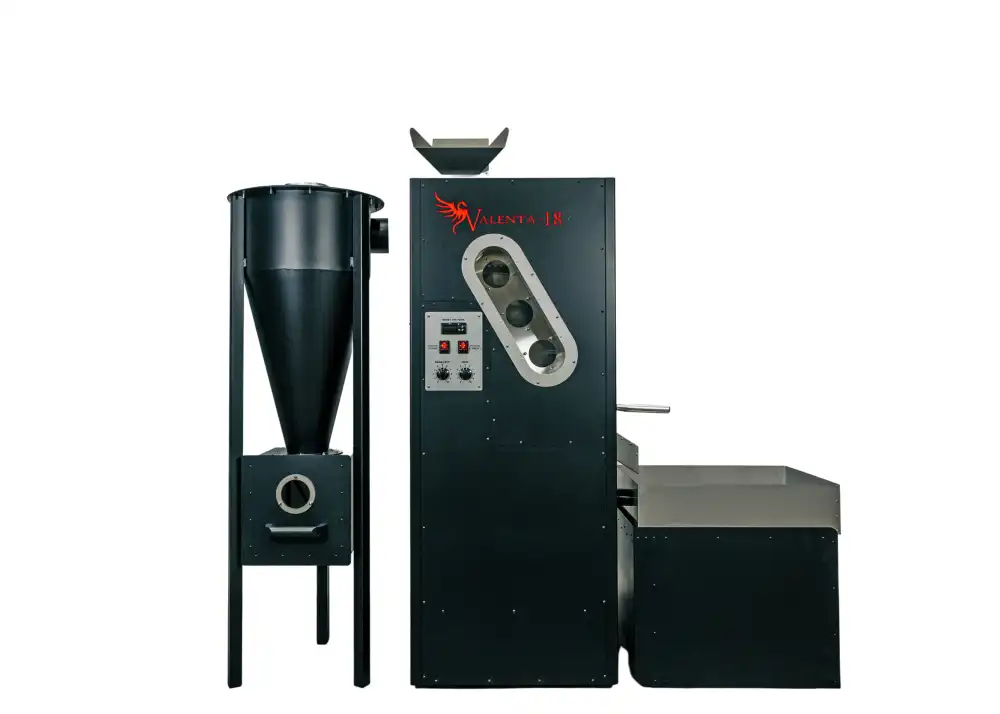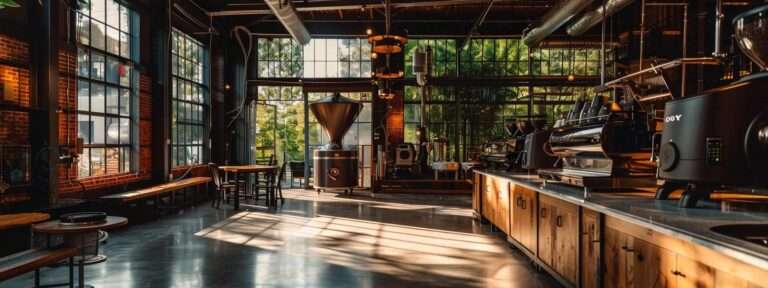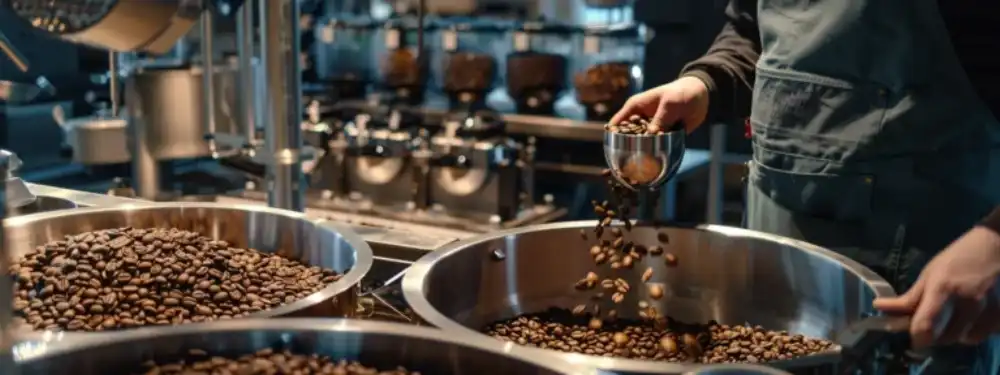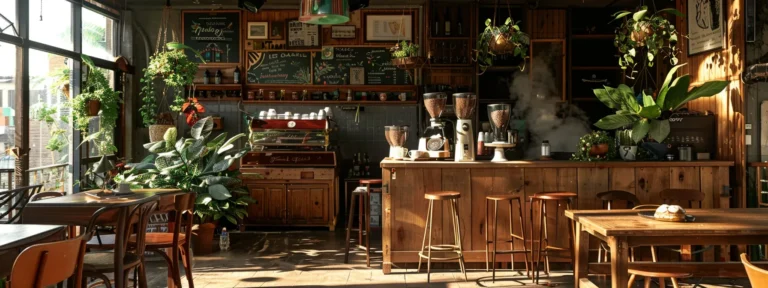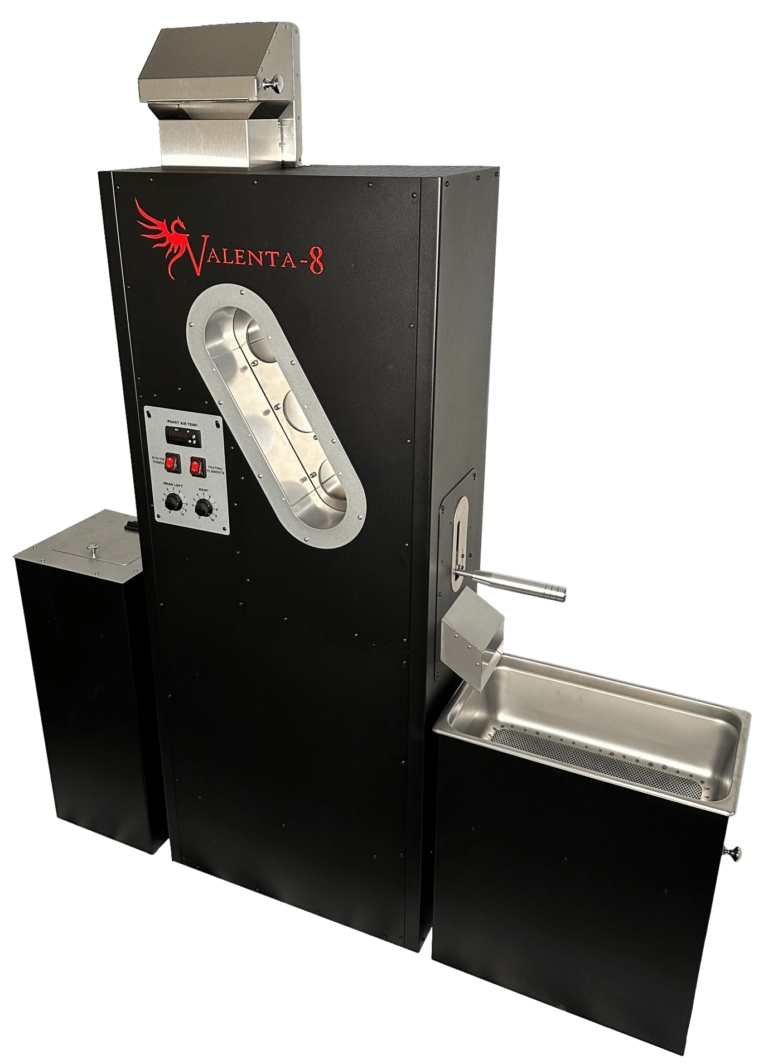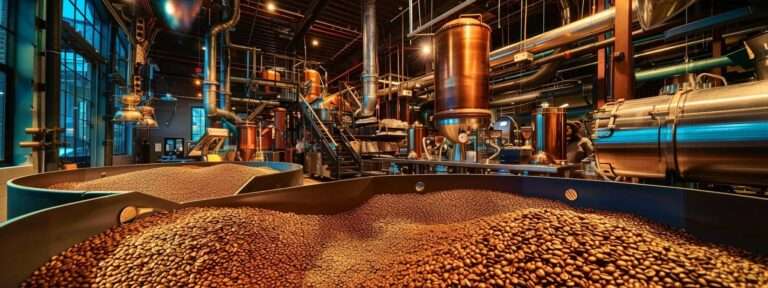Navigating the landscape of commercial coffee roasters can be as complex as the art of roasting coffee beans themselves.
Whether you’re an artisan barista aiming to refine the taste and aroma of your specialty coffee, or a bustling café looking to increase efficiency with an industrial coffee roaster, selecting the right machine is pivotal.
Considerations range from the type of heat transfer and fuel—be it natural gas, propane, or efficient electricity use—to automation features that streamline your operation.
Delving into the details of drum speed, infrared sensors, and the presence of an afterburner for minimizing air pollution are just as important as the machine’s footprint in your commercial space.
Keep reading to discover the perfect blend of technology, sustainability, and performance that will elevate your coffee roasting experience.
Understanding Your Business’s Coffee Roasting Needs
Delving into the world of commercial coffee roasting launches a cascade of decisions that could significantly impact the flavor of your brew and, by extension, your brand’s reputation.
The cornerstone of this selection journey rests upon a clear understanding of your business’s unique needs.
It’s not simply a matter of choosing a machine with the most bells and whistles; rather, it involves a tailored consideration of your projected daily output, the diverse selection of beans you aim to transform from green to gold, and the spatial logistics within your establishment.
Acknowledging these facets ensures the cornerstone of your coffee offering – the roast – exemplifies the precise character and taste your brand promises.
Evaluate Your Daily Output Requirements
Assessing daily output needs is the linchpin in choosing a commercial coffee roaster; it dictates whether you’ll require the robust capacity of an industrial coffee roaster or the agility of a more compact machine. Larger operations may depend on the reliability of a roaster equipped to handle extensive batches without a dip in quality, warranting a look at machines fueled by natural gas or propane for their potent heat sources.
Conversely, small to mid-sized cafes or boutique roasteries might lean towards machines that prioritize flexibility and efficient energy use. An artisanal approach often involves roasting in smaller quantities to ensure maximum freshness, calling for a system that balances speed with precision—a task well-suited for an espresso machine-grade roaster guided by intuitive software.
Consider the Variety of Beans You Plan to Roast
Every bean carries its own story, a unique profile of flavors and aromas that can either flourish or falter under the heat of a roaster. The variety of beans you plan to roast should influence the type of machine you select, considering factors such as heat transfer, airflow, and control over the roast curve to highlight the bean’s best characteristics.
A sophisticated specialty coffee roaster knows their machine must be as dynamic as the beans themselves, with the ability to adjust to the specific needs of each batch. Whether it’s a delicate light roast requiring gentle heat or a dense bean that benefits from the searing power of a flame, your choice in a roaster should accommodate the full spectrum of coffee experiences you wish to craft.
Assess Space Availability for Equipment
Surveying your venue’s layout emerges as a pivotal step before cementing the decision on a coffee roaster. A sprawling cafe may accommodate a larger machine such as an industrial coffee roaster with a dedicated area for venting smoke and diverting air pollution through an afterburner, whereas a snug artisan workspace might necessitate a compact espresso machine that operates on electricity with a minimal footprint.
Your workspace configuration not only determines the size of the roaster but also influences the type of roasting technology—a drum roaster or a fluid bed design. For establishments where space is at a premium, a model with a vertical layout and integrated chaff collection may provide the perfect synergy between functionality and spatial economics, ensuring seamless operation without compromising on taste or aroma.
Exploring Different Types of Commercial Coffee Roasters
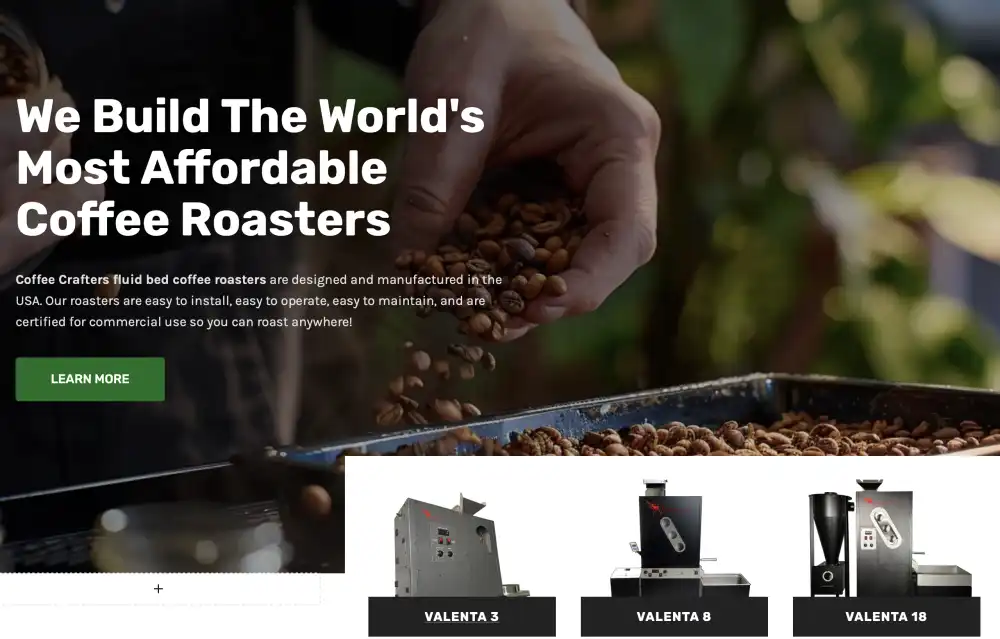
Finding the ideal commercial coffee roaster is a nuanced process that hinges on matching your business’s roasting philosophy with the right technology.
Consider the classic debate of drum versus hot air roasters; drum roasters, with their steady rotation and conductive heating, offer a traditional approach, often favored for their rich and full-bodied profiles.
On the other hand, hot air or fluid bed roasters employ convective heat transfer for a cleaner, more uniform roast.
Additionally, the batch size capability of each machine can’t be overlooked, as it directly affects your ability to meet demand without overextending your resources.
Lastly, the decision between manual and automated operation features can drastically alter the barista’s interaction with the roasting process, whether it calls for an artisan’s touch or the precision of automation.
Each option brings with it a different set of benefits that can either enhance or constrain the coffee roasting experience within your establishment.
Drum vs. Hot Air Roasters
The roasting method you select can be as personal and distinctive as the coffee you serve. Drum roasters, revered for their consistency and depth of flavor, operate through the direct contact of beans with a heated metal surface, meticulously coaxing out complex flavor notes through traditional means.
Contrastingly, hot air roasters, also known as fluid bed roasters, take a modern approach by leveraging the power of hot air to roast the coffee beans in a more uniform manner, reducing the risk of scorching and delivering a bright, clean taste that’s remarkable in light roasts and single-origin beans.
Batch Size Capabilities
Grasping the concept of batch size capabilities is key when it comes to selecting a commercial coffee roaster; it’s the golden rule that harmonizes your operation’s scale with the demands of your customers. Smaller cafés might find solace in a roaster that allows the barista to engage more frequently with the process, adjusting variables to suit an ever-changing array of beans, thus reflecting an agility that large batch roasters may not provide.
In contrast, high-volume coffee shops and roasting facilities look towards a machine that won’t falter under the weight of heavy use. These establishments align with roasters that not only promise large batch processing but also ensure the consistency and uniformity of each and every roast, regardless of the heavy workload they bear.
Manual vs. Automated Operation Features
The realm of commercial coffee roasting machines offers a spectrum of operation features that cater to the distinct preferences of a barista or roaster. Those who yearn for hands-on control may gravitate toward manual machines, where the art of crafting the perfect roast can thrive through tactile engagement and traditional roasting techniques.
Automated roasters, conversely, shine in environments that demand consistency and precision, often found in larger operations. Equipped with sophisticated electronics and touchscreen controls, these machines allow the user to program and replicate profiles for different bean varieties, delivering a consistent product with reduced labor input.
Key Features to Look for in a Commercial Coffee Roaster
Finding the best Commercial Coffee Roaster involves examining a spectrum of features that align with not only your production needs but also the goals you’ve set for your coffee’s flavor profile. After reading this, we hope you consider Coffee Crafters to supply you with the most affordable commercial coffee roasting machine on the market.
Consistency in roast quality is paramount, ensuring that each batch meets the high standards your customers expect.
Equally important are control and customization options, which provide the flexibility to accentuate the unique characteristics of different coffee beans.
Lastly, as businesses increasingly focus on their environmental impact, prioritizing energy efficiency and sustainability in your equipment selection can lead to long-term savings and resonate with eco-conscious consumers.
Catering to these facets will foster confidence in your roasting process and satisfaction in the cups you serve.
Consistency in Roast Quality
A reliable commercial coffee roaster is the heartbeat of any coffee-focused business, ensuring each batch of beans offers the same richness and depth customers come to expect. The sophistication of a machine’s temperature control and the precision of its heating element are critical factors that contribute to uniformity in each roast, safeguarding your coffee’s quality round after round.
In an industry where taste is king, maintaining roast consistency is not just about reputation—it’s about customer loyalty. High-quality roasters, constructed of sturdy steel and featuring advanced heat transfer technology, enable baristas to replicate desired profiles with accuracy, delivering the same beloved flavors and aromas cup after cup.
Control and Customization Options
In the quest for the perfect roast, control and customization options stand out as critical components of a commercial coffee roaster. The ability to fine-tune temperature settings, adjust airflow, and manipulate the length of the roasting cycle allows operators to adapt to the unique requirements of different coffee bean varietals, ensuring that each batch captures the desired flavor profile with precision.
Advanced roasters cater to these customization needs with user-friendly interfaces, such as touchscreen panels that enable swift alterations and store roast profiles. Proactive baristas and roasters can experiment with various parameters to extract rich aromas and nuanced tastes, effectively elevating the coffee experience to meet both personal standards and customer expectations.
Energy Efficiency and Sustainability
As the demand for greener operations surges, selecting a commercial coffee roaster with a commitment to energy efficiency becomes imperative. Equipment designed with energy-saving features not only trims utility bills but also adheres to a rising standard of sustainable business practices, aligning your brand with values important to the contemporary consumer and the broader community.
Indeed, sustainable Commercial Coffee Roaster machines often incorporate advanced technologies like infrared burners or efficient energy use systems that optimize heat transfer and roasting time. This focus on sustainability extends the lifespan of the machine, reduces the carbon footprint of each roast, and establishes your business as a conscientious leader in environmental stewardship within the industry.
The Importance of Brand and Manufacturer Reputation
Let Coffee Crafters Help You Become A Coffee Roaster

When venturing through the myriad of options in the market for the best coffee roaster machine commercial grade, the reputation of the brand and the manufacturer should be at the forefront of your decision-making process.
A well-established and dependable brand not only ensures a quality product but also reflects a history of reliability that can safeguard your investment.
It’s vital to immerse yourself in research, scoping out the brand’s standing through the eyes of industry veterans and previous customers.
Reviews offer invaluable insight into the performance and longevity of the machines in a real-world setting.
Moreover, the presence of comprehensive warranty options and responsive after-sales support services speak volumes about a manufacturer’s confidence in their product and their commitment to customer satisfaction.
Collectively, these factors form a triad of trust, setting the stage for the topics of researching brand history, dissecting industry peer reviews, and understanding the promise of warranty and support services.
Researching Brand History and Reliability
When embarking on the journey to find an exceptional commercial coffee roaster, investigating a brand’s heritage and dependability is a step one cannot afford to skip. A brand with a storied history in the coffee industry often brings to the table a legacy of quality and a thorough comprehension of the roasting craft, which can significantly influence the performance and reliability of their machines.
Critical to informed decision-making is examining the longevity and stability of the manufacturer. Aided by email correspondence, archived data, and testimonials, a smart business delves into the backgrounds of potential manufacturers to ensure they’re aligning themselves with a partner known not only for resilient and intuitive roasting machinery but also for a robust track record of customer satisfaction and ongoing support services.
Reading Reviews From Industry Peers
Navigating through the testimonials of industry peers can provide grounded perspectives on the performance of commercial coffee roasters. Respectfully, feedback from fellow coffee shops and roasting facilities can shed true-to-life light on aspects such as durability, ease of use, and the consistency of the roast, which might not be immediately apparent from manufacturers’ specifications or advertising claims.
Industry forums and professional networks often buzz with firsthand accounts of different brands of coffee roasters in action. Engaging with these communities and asking for recommendations—or warnings—ensures that you’re gaining insights not just from theoretical knowledge, but from the lived experience of those who share your passion for specialty coffee.
Warranty and After-Sales Support Services
A robust warranty acts as a safety net for your investment in a commercial coffee roaster, ensuring that any unforeseen issues can be addressed without incurring significant additional costs. Good after-sales support services further cushion your operation from downtime, enabling swift resolution of technical difficulties and routine maintenance inquiries.
Manufacturers that deliver exceptional after-sales services tend to forge lasting relationships with business owners. Their dedication to support reflects a commitment not just to the functionality of the machine, but also to the smooth, uninterrupted operation of your business.
Budgeting for Your Commercial Coffee Roaster
Identifying the optimal Commercial Coffee Roaster blends financial foresight with savvy investment strategies.
A keen understanding of the initial purchase price versus the long-term value plays a central role in forging a cost-effective path forward.
Beyond the sticker price, diving into the realms of operating and maintenance expenses shines a light on the true cost of ownership.
Exploring financing options and projecting the return on investment remains pivotal, ensuring that the chosen roaster aligns with both current financial realities and future growth objectives.
Acknowledging each of these financial aspects guides businesses toward a decision that balances the scales between immediate affordability and enduring value.
Initial Purchase Price vs. Long-Term Value
An upfront expenditure on a commercial coffee roaster often reflects the unit’s sophistication, capacity, and the quality of its construction materials, such as stainless steel. While a higher-priced machine may stretch initial budgets, it often translates into greater durability, lower fuel consumption, and a more consistent product, ultimately influencing a roaster’s return on investment.
Conversely, investing in a less expensive model can lead to higher operational costs down the line, including frequent repairs or increased energy consumption. Thoughtful consideration of a roaster’s total life cycle cost should factor into your budgeting to ensure that savings gained at the point of purchase do not lead to greater expenses as your business evolves.
Operating and Maintenance Costs
Factoring in the operating and maintenance costs of a commercial coffee roaster is essential to the financial health of your business. These are the recurring expenses that accumulate over the lifespan of the machine, such as costs for electricity or natural gas, spare parts, and the potential need for regular servicing to maintain optimal performance and efficiency.
Additionally, a roaster’s design can influence these costs substantially; for example, a model featuring an afterburner to mitigate smoke and aroma might increase fuel usage, while roasters designed for efficient energy use could lower monthly bills. Regular cleaning and maintenance schedules with a machine built to simplify these processes can also alleviate some costs, ensuring longevity and consistent quality of your roasts.
Financing Options and Return on Investment
Exploring financing options can ease the upfront burden of purchasing a high-quality commercial coffee roaster. Opting for leasing arrangements or payment plans allows businesses to distribute the investment over time while reaping the benefits of a premium machine, supporting cash flow management and preserving capital for other business opportunities.
The return on investment for a commercial coffee roaster should be measured against the enhancement in coffee quality and customer satisfaction it provides. An exceptional roaster can be a catalyst for business growth, attracting more customers and enabling higher pricing for premium roasts, which compounds return over time beyond the initial financial outlay.
Installation, Training, and Maintenance
Embarking on the acquisition of a Commercial Coffee Roaster involves more than just a financial commitment—it’s a venture into establishing the backbone of your coffee operation.
The intricacies of professional installation cannot be overemphasized, as it lays the groundwork for seamless integration within your existing setup.
Complementary to this is the essential step of equipping your staff with robust training, ensuring both competent operation and stringent safety standards are upheld.
Moreover, the cultivation of a diligent maintenance regime is the key to preserving the machine’s integrity and performance, which directly reflects on the quality of the coffee and the efficiency of your business.
Professional Installation Requirements
Ensuring a proper installation is crucial for any new commercial coffee roaster, as it impacts not just the machine’s performance, but also its safety and longevity. A professional installation ensures that crucial factors such as ventilation, power supply, and space requirements adhere to both manufacturer specifications and local regulations.
Securing the services of a skilled technician can avert common installation pitfalls. They bring the necessary expertise to optimize the setup in your particular environment, which in turn helps to maximize efficiency and reduce the risk of operational disruptions or hazardous conditions.
Staff Training for Operation and Safety
Efficient and safe operation of a commercial coffee roaster hinges on comprehensive training for staff. Enabling employees to thoroughly understand the machinery’s nuances fosters not only adept handling but also ensures that every batch of coffee beans is roasted to perfection, safeguarding both the quality of the drink and the machine’s longevity.
It’s imperative for businesses to underline the safety protocols associated with operating their coffee roaster, as high temperatures and moving parts pose potential risks. By being proactive in training, companies instill confidence and responsibility in their staff, ensuring a safe working environment that complies with all safety standards and regulations.
Regular Maintenance and Service Schedules
Establishing a routine for service and maintenance is a safeguard for your investment in a commercial coffee roaster. Regular check-ups and fine-tuning guarantee the machine operates at peak efficiency, preventing costly breakdowns and ensuring a continuous supply of freshly roasted coffee for your patrons.
Engaging with a qualified technician for ongoing maintenance ensures your coffee roaster’s longevity and reliability. Timely replacements of worn components, such as heating elements or fans, coupled with software updates, keep the machine current and reduce the likelihood of disruptive malfunctions.
Selecting the optimal commercial coffee roaster is crucial for maintaining the consistency and flavor that define your coffee brand’s reputation.
It reflects your commitment to quality, as the machine your choose directly influences the daily output, bean variety accommodation, and energy efficiency of your roasting process.
A judicious choice supports not only the present operations but also caters to growth and environmental considerations, reinforcing your brand’s position in the market.
Ultimately, the right Commercial Coffee Roaster becomes a pivotal asset in crafting exceptional coffee experiences that foster customer loyalty and business success.



